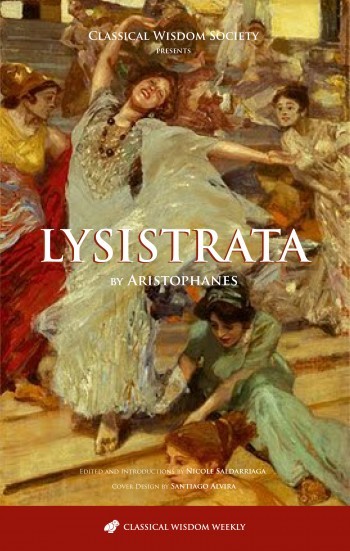


But the scene goes beyond humour and intertextual allusion to encapsulate the themes of the play. So there is a nice allusion to and inversion of a moment in the tragic theatre. The messenger who comes to tell the protagonist Eteocles about the enemy at the gates (42ff.) describes how the enemy make a blood sacrifice into a shield. But Aristophanic jokes are often multi-layered and for anyone who knows their Aeschylus this scene also invites comparison with a moment in one of the (by now) classics war plays, Aeschylus' Seven Against Thebes.

This is of course at one level a typical Aristophanic joke about female drunkenness of a sort which crops up elsewhere in comedy. The women in swearing to create peace sacrifice wine into a shield. The play with props begins right at the start of the play, with the oath swearing. I start with props, stage objects used or carried by the characters or just located in dramatic space. But for a creative writer-director theatre is medium of communication, not just a set of physical structures and dramatic conventions and it is a medium which presents opportunities rather than limitations. Scenery was limited, lighting non-existent, technology confined to the crane and the ekkyklema, the trolley (we think) used to draw indoor tableaux into the acting space. But the way the author approaches the staging itself pulls these issues together impressively.Īristophanes' theatre was from a modern perspective minimalist. The theme itself is a director's gift, because it deals in big confrontations, pits male and female, peace and war against each other.

Lysistrata is a wonderful play for the stage. Even when we are reading, we need always to bear in mind the staging invited by the text. But Athenian comedy is in many ways a far more physical medium than tragedy. This is true of tragedy as well as comedy. Though we (mostly) meet him on the page, he wrote with live theatre and a live (and demanding) audience in mind. Stage action in Lysistrata, by Professor Chris CareyĪristophanes was first and foremost a dramatist. The play was written against the backdrop of the final years of the Peloponnesian War (a long and destructive war between Athens and Sparta): Athens had suffered major military setbacks, and shortly after the performance of the play there was an anti-democratic coup in the city which installed a brutal oligarchic regime (the historical background is given in Thucydides' History, book 8). Aristophanes, the great comic dramatist of Athens, wrote the Lysistrata for performance in February 411 BC, probably at the Lenaia.


 0 kommentar(er)
0 kommentar(er)
